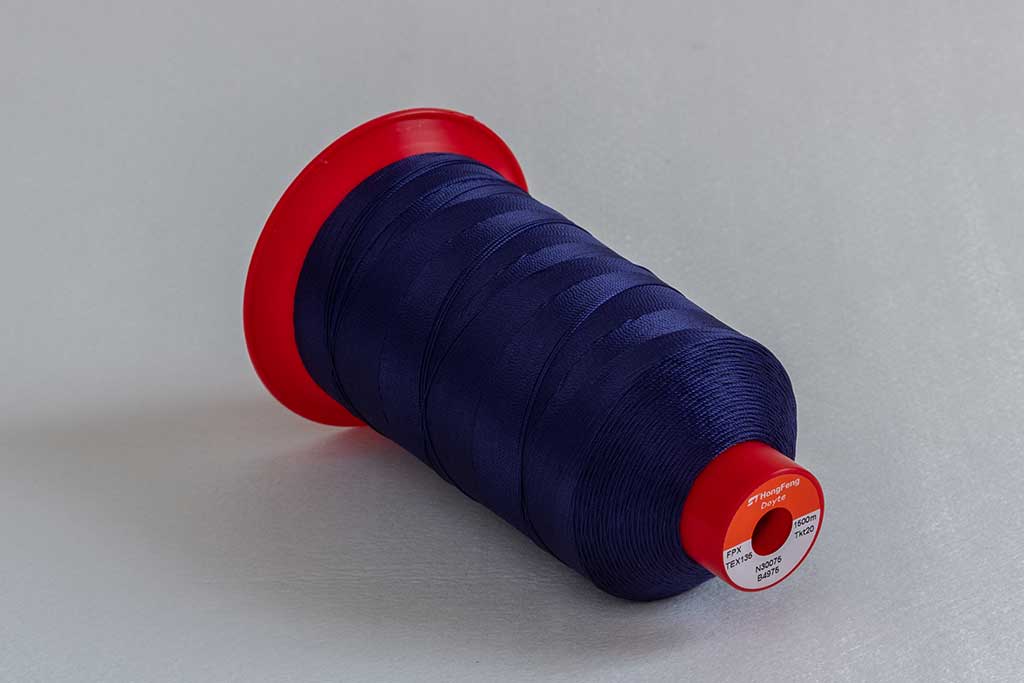In the world of sewing and textiles, “210D/3 Bonded Polyester Thread” has established itself as a force to be reckoned with. This specialized thread, known for its exceptional strength and versatility, has become a go-to choice for a wide range of applications. From outdoor gear to upholstery and beyond, 210D/3 bonded polyester thread delivers durability and reliability in every stitch.
210D/3 bonded polyester thread is crafted from high-quality polyester fibers, meticulously bonded together to create a robust and resilient thread. The “210D” refers to the thread’s denier count, representing the thickness and strength of the thread. In this case, 210D indicates a thread with a denier of 210, and “3” signifies that three strands of this bonded thread are twisted together. The bonding process enhances the thread’s strength, making it suitable for heavy-duty applications.
Table of Contents
The Manufacturing Process
The production of 210D/3 bonded polyester thread involves several critical steps. It begins with the extrusion of polyester fibers, which are then passed through a bonding agent that effectively fuses the fibers together. This bonding process creates a cohesive thread with exceptional tensile strength and resistance to abrasion.
Once the bonding process is complete, the individual threads are twisted together to form the final 210D/3 bonded polyester thread. The thread is then wound onto spools, ready to be utilized in various applications that demand strength and durability.
Properties That Define Excellence
210D/3 bonded polyester thread boasts an array of properties that make it a standout choice in the textile world. Its most notable feature is its remarkable tensile strength, which allows it to withstand substantial pulling forces without breaking or fraying. This makes it an ideal choice for applications where durability is paramount, such as outdoor gear, heavy-duty bags, and industrial textiles.
Additionally, the thread’s resistance to abrasion ensures that stitches remain intact even in high-friction situations. This property is particularly valuable in items that experience constant wear, like backpacks, tents, or upholstery.
Moreover, 210D/3 bonded polyester thread exhibits excellent resistance to moisture, chemicals, and UV rays. This makes it a reliable option for products that will be exposed to challenging environmental conditions, ensuring that the thread maintains its strength and integrity over time.
A Comparison of Thread Denier Counts
| Thread Denier Count | Thickness | Strength | Applications |
|---|---|---|---|
| 40D/2 | Fine | Moderate | Lightweight Fabrics, Fine Sewing |
| 70D/3 | Medium | High | General Sewing, Apparel, Home Textiles |
| 150D/2 | Medium | High | Upholstery, Leather Goods |
| 210D/3 (Bonded) | Thick | Exceptionally High | Outdoor Gear, Heavy-duty Bags, Industrial Textiles |
| 600D/6 | Very Thick | Extremely High | Heavy-duty Products, Webbing, Luggage |
Applications Across Industries
210D/3 bonded polyester thread finds widespread use across various industries due to its strength and versatility. In the realm of outdoor gear and equipment, such as backpacks, tents, and tarps, this thread plays a pivotal role. These items often endure rough handling and exposure to the elements, making the thread’s robustness vital for ensuring their longevity and performance.
Upholstery and home textiles also benefit from the use of 210D/3 bonded polyester thread. Its ability to withstand constant wear, exposure to sunlight, and potential spills ensures that upholstery remains in excellent condition over time.
Furthermore, the thread’s resistance to chemicals makes it a preferred choice for industrial textiles, like heavy-duty bags or conveyor belts. Its exceptional strength ensures that these products can endure the demanding conditions of industrial settings.

Advantages Over Alternative Threads
Compared to other thread types, 210D/3 bonded polyester thread offers several advantages. Its thickness and bonding process provide superior tensile strength compared to finer threads like 40D/2 or 70D/3, making it more suitable for heavy-duty applications.
While thicker threads like 600D/6 offer even higher strength, 210D/3 strikes a balance between strength and manageability. The latter is easier to work with on standard sewing machines while still providing exceptional durability.
Tips for Working with 210D/3 Bonded Polyester Thread
- Choose the appropriate needle size and sewing machine settings for smooth sewing.
- Test the thread tension on a scrap material before starting your project.
- Store the thread in a cool, dry place to maintain its properties.
- Use a heavy-duty or upholstery needle when sewing thicker fabrics.
- Avoid excessive tension or pulling to prevent thread breakage.
Conclusion
210D/3 bonded polyester thread has solidified its position as a powerhouse thread in the textile industry. Its remarkable strength, resistance to abrasion, and versatility make it a top choice for a wide range of applications. From outdoor gear to upholstery and industrial textiles, this thread’s reliability ensures that every stitch contributes to durable and long-lasting creations. As the demand for high-performance materials continues to grow, 210D/3 bonded polyester thread will undoubtedly remain an essential tool for unleashing the strength in every stitch.
